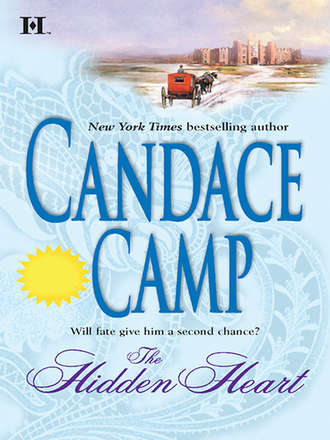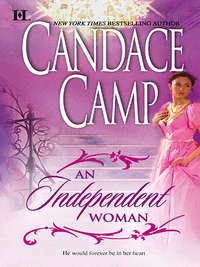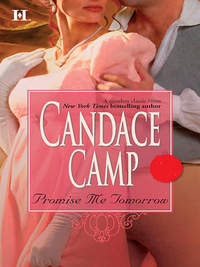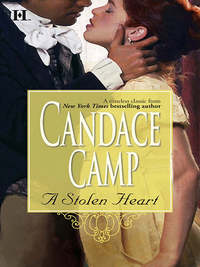
Полная версия
The Hidden Heart
“No!” Miss Brown looked dismayed. “He never said that.”
“Close enough. He says it’s not the ‘proper place’ for a child, him being a bachelor. He is the most arrogant, irritating man—I cannot imagine why the General thought he would take care of Gaby. He was obviously deluded about the duke’s sense of honor and duty.”
“Oh, no, he is an honorable man!” the older woman protested. “And he would not shirk his duty.”
“Mmm,” Jessica replied on a note of disbelief. “So long as it did not put him out, I suppose.”
“You must not judge him so harshly,” the housekeeper told her earnestly. “The duke is a good man. He really is. You have to understand—he has had a sad history. Things have happened to him that have made him, well, a bit of a recluse, but there isn’t a wicked bone in his body.”
“What else would you call it when he rejects an orphaned girl whose last relative has just died, who has been entrusted to him by a man who was his friend? Her father and General Streathern trusted him to take care of Gabriela, but he cannot be bothered. So he plans to ship her off to whoever will take care of her for him.”
Jessica glanced at the housekeeper and saw a look of great sadness on her face. The woman shook her head, saying, “Ah, poor man. It must be because of Alana. No doubt he cannot bear to be around a child again.” She looked at Jessica. “Why don’t you come back to my sitting room and warm up with a cup of tea? I will tell you about His Grace and why, well, why he is as he is.”
Jessica agreed readily, curiosity as much as the cold impelling her inside. The two women turned and retraced their steps to the house, where the housekeeper hung up their cloaks and led Jessica along a back hall and through the kitchen into a cozy little sitting room beyond that was the housekeeper’s domain. A word to a maid as they passed brought her to the room a few moments later with a pot of tea and cups, and a dish of scones, on a tray.
The scones were delicious, and a few sips of the strong sweet tea warmed Jessica up almost immediately. She settled back into the comfortable chair to listen to Miss Brown.
“I have known His Grace since he was a little boy. So have Baxter and most of us older servants,” she began, her brown eyes alight with fondness. “He was always a wonderful boy. And as he grew into manhood, well, you could not ask for a kinder or better employer. Almost ten years ago he married Caroline Aincourt, the daughter of the Earl of Ravenscar. An excellent marriage—old family, good name—but far more than that, His Grace was madly in love.”
Miss Brown let out a little sigh, her eyes taking on a faraway look. “Oh, but she was a beauty. Every inch a duchess, she was. Tall and striking, with black hair and green eyes. Good-looking lot, the Aincourts, whatever else they might be. There’s a portrait of her in the Great Hall. They were very happy. And, oh, the times we had at the castle then! There were often guests—for weeks at a time, sometimes. Balls and dinners and all sorts of entertainment. His Grace was a sociable man.”
“The duke?” Jessica asked in disbelief.
The other woman nodded. “Oh, yes. I am sure you would not credit it, to see him now. But he enjoyed company. He wasn’t one of those who was irresponsible or wild, you understand. He always did his duty and took an interest in his affairs, but he liked a party as well as the next man. And the duchess! Well, she fairly glowed at a ball. She was always the center of attention. They had a daughter, Alana.”
“A daughter? He said nothing about her. He said that his wife had died, but…”
Miss Brown nodded, her eye darkening a little. “Oh, yes, he had a daughter.” She smiled to herself. “Ah, she was a corker, that one. Lively as could be, always into everything, but no one could get mad at her, because she had the sunniest disposition. All she had to do was smile at you and say she was sorry, and you would forgive her anything. After she was born, they spent even more time here, only going to London for the height of the season. The duke felt it was better to raise a child here in the country, you see. Miss Alana didn’t even sleep in the nursery. His Grace thought it was too far away: they could not hear if she cried out. She stayed right down the hall from her parents, and her nurse slept on a bed in her room.”
“What happened? I mean, what changed everything?”
“They were in a carriage accident. The duchess and the little one were killed.”
“Oh, how awful.”
The housekeeper nodded, her eyes filling with tears as she remembered. “His Grace was riding outside the carriage. It was winter, before Christmas, right about this time of year, in fact.” She sighed. “They were probably driving too fast. Anyway, the carriage overturned as they took a corner. It rolled down an embankment, and the duchess was thrown out. Her neck was broken, and she died instantly. But the carriage, with the wee one inside, rolled on down into the pond.”
Jessica drew in her breath sharply in horror. “Oh, no! How awful!”
“There was a thin layer of ice on the top of the pond, but of course the coach broke right through. His Grace went in after her. The coachman said it was a pitiful sight, how he dived again and again into the cold dark water. Finally, he brought her up and carried her onto land, but it was too late. The poor sweet child was dead.”
Sympathetic tears welled in Jessica’s eyes as she thought about the horrific scene—the frantic parent, the frozen pond, the dark, icy night. She could imagine the overturned carriage, the frightened horses, the beautiful woman dead on the ground, and the duke throwing himself into the icy water in a desperate search for his child, emerging at last with her still form.
“He carried that child in his arms all the way home, and when he walked through the door, holding her—I’ll never forget his face that night. I’ve never seen anything as bleak. We could hardly pry the child out of his arms and bundle him off to bed himself. He came down with a terrible fever—it was no wonder, him being in that icy water and then in freezing weather all the way home—and he nearly died himself. His valet, Noonan, and Baxter and I took care of him. For days we thought we were going to lose him, too, and then it was still more weeks before he was well. He was so gaunt you would hardly recognize him, and that’s a fact. He aged years in those weeks.”
“Poor man.” However much he had angered Jessica, her heart was wrung with pity for him. He had suffered terribly—the loss of a beloved spouse was sad enough, but to have had his adored daughter taken at the same time seemed almost too much to bear.
“Yes.” The housekeeper heaved a sigh and leaned forward to replenish their cups with tea. After a moment, she went on. “After that he changed. Not just the way he looked. The way he was. At first he just sat in his chair and stared out the window. Didn’t seem to care whether he lived or died. He would hardly see anyone—wouldn’t let the vicar anywhere near him, and he barely tolerated the doctor. The only one who had much luck with him was Lady Westhampton, his wife’s sister. He would see the duchess’s brother, as well, Lord Ravenscar. The only place he would go was to the graveyard. It was terrible…terrible…. We were all so worried about him. Finally, one day, he told us he was going back to London. We were happy, thinking he had decided to get on with his life.” She paused, and tears glinted in her lively brown eyes.
“But he had not?” Jessica prompted gently after a moment.
The housekeeper shook her head. “Later he told his valet that it was just that he could not bear to live in this house any longer. It’s his ancestral home—it has been the seat of the Dukes of Cleybourne since 1246. And he lived in it his whole life. But he hasn’t been home for almost four years.”
“But surely he has gotten out more, living in London. He has lived a fuller life, even if he could not face this house.”
“No. I only wish he had. Baxter writes to me every month with news about His Grace and the household. You see, only a skeleton staff and I stayed here. Most of the staff went with him, so we are always eager for news of the rest.” She smiled. “We are close, a kind of family, you see. So I write to Baxter and he to me, and we share the news with the others. The sad truth is that for all that time His Grace has been a recluse in London as much as he ever was here. He sees his relatives and friends every once in a while—if they come to visit him. He never calls on others, and he does not attend parties. Baxter says he never even visits his club. He has shut himself off from the world. And Lady Westhampton, the Duchess’s sister, is worried about him. She has told Baxter that lately he has seemed even more melancholy. Of course, this time of year is the worst for him.”
“But he came back here,” Jessica pointed out. “Surely that is a good sign.”
“We hoped so. I was very cheered. But he—well, he is as polite and nice as ever, but there is a a sadness to him that just hurts my heart to see. Sometimes I worry about why he came home now.”
“What do you mean?”
The other woman frowned. “I’m not entirely sure, miss. But it being this time of year and all…I can’t help but think, maybe he’s come home to die.”
“To die!” Jessica raised her eyebrows in surprise. “But he is still a young man. He can’t be forty yet.”
“No, miss. He’s thirty-five is all. But…”
“Surely you don’t mean—” Jessica looked shocked. “Do you actually think he might intend to…to harm himself?”
Her companion looked even more troubled. “I don’t know. I don’t want to think so. He’s a strong man, but sometimes I fear that he has given in to despair. I think perhaps he hoped that one day, being in London, away from here, he would begin to heal his sorrow. Maybe he has become so heartsore that he fears he never will. I think Lady Westhampton feared it. She cautioned Baxter to look after His Grace carefully. Not, of course, that he would ever have done any less than that, and her ladyship knows it. It was a sign of her worry about him.”
She sighed, then shook her head firmly. “No, I will not think that. But, you see, that is why I was so happy to hear this morning that you and the young miss had arrived. I thought, a child in the house is just what he needs. She will bring life to the place again, and laughter. But when you told me that he would not keep her, would not even see her…” Again she sighed. “Ah, me, it’s a sad, sad thing. I think he must feel that he cannot bear to see a child here. Miss Gabriela is older than his own little one would have been, but still, it would be a reminder to him of all that he has lost.”
“Then that is why he wants to find someone else to take her guardianship from him. I am sorry. I misjudged him.” Jessica frowned. “Poor man. I thought him simply grim and unsociable. I had no idea such loss lay at the base of his actions.”
She thought back to the duke’s sharply carved face—the jutting lines of cheekbone and jaw, almost gaunt in their severity, the dark, brooding eyes, the taut lines of his body—and she could see now the sorrow that lay behind those things.
“It is too bad that he has decided to turn Gaby away,” Jessica went on. “I think you are right. She might be just the thing he needs in his life.” She sighed. “Ah, well, I shall just have to explain it to Gaby as best I can.”
After Jessica left the housekeeper’s room, she walked into the Great Hall, the large area that ran back through the middle of the house from the front door, centered by the staircase. It was two stories high and had been the main room of the castle back in its early days. It was here that the housekeeper had said the late duchess’s portrait hung.
Obviously the first few pictures were not of her, for they were of men in the attire of Tudor and Stuart times. She came upon a painting of a woman in a high white-powdered wig, and then, just beyond that, was a portrait of a young woman in modern dress. Jessica stopped, sure that this must be the duke’s Caroline. She was beautiful, even allowing for the flattering nature of most portraits. Tall and slender, she smiled invitingly out at the viewer. There was a dimple in one cheek, and her green eyes twinkled. She stood beside a chair, one slender hand resting upon its back, and at her feet sat a toy spaniel, its black-and-white coloring reflecting the coal-black of the woman’s hair. She was dressed in green velvet that emphasized her large eyes, and a magnificent emerald ring glowed on her finger.
It was easy to see why Cleybourne had been so in love with her. She looked like the sort of woman who had men falling at her feet, declaring love. Jessica gazed at her with a certain fascination. She had never possessed the sort of charm that it was clear this woman had had. A gawky adolescent, Jessica had grown awkwardly into womanhood, and her blunt tongue and forthright manner had put off many a would-be suitor. She had never had the gift that women like the duchess seemed to possess naturally—the ability to flirt and beguile, to beckon men with a look or a smile. Her aunt, who had introduced her into society when she was eighteen, had often despaired of her, declaring that she would never catch a husband if she persisted in talking to men about the war in Europe instead of smiling and simpering like the other girls. Aunt Lilith, she remembered, had been both ecstatic and amazed when Darius offered for her. Jessica gave a small, wry smile as she thought that she, too, had been rather surprised.
Shrugging off her memories, she turned away and started up the stairs. It was useless to think of the past. She would not know the sort of married happiness she had dreamed of as a girl, but thanks to the General’s generosity, she would be well able to live without having to scrimp and save, or depend on others. She had her independence, and she had Gabriela, and she would have a very pleasant life.
Jessica turned over in her bed, sighing. It was late, and Gabriela had gone to sleep at least an hour earlier. Sleep, however, had eluded Jessica.
It was not for lack of physical weariness. Baxter had offered to show them around the house, and she and Gabriela had spent the majority of the day tramping all over with him. Surprisingly tireless for a man his age, the butler had shown them the entire castle, even poking into the unused wings and the cavernous cellars that had once held the castle’s dungeons and storerooms. Gabriela had especially enjoyed the latter visit, shivering with obvious delight at Baxter’s ghoulish stories of the dungeons. Afterward, he had turned them over to the head gardener, who had given them an equally detailed tour of the gardens and outlying areas. By the end of the day, even Gabriela was thoroughly worn-out. Jessica had been grateful for the exercise for both of them, after almost two days spent in a carriage, and she had thought she would sleep easily.
Instead, as soon as her head touched her pillow, she had started to think of all the problems and pitfalls that lay before them. She had tossed and turned for almost an hour.
Finally, she admitted to herself that she was not going to fall asleep any time soon. Jessica got out of bed and pulled her dressing gown on over her nightgown. She decided that she would read for a while in the hopes that that would encourage her to sleep. She thought that she remembered the way to the library, which Baxter had showed them earlier.
She checked on her charge, who was sleeping soundly, then slipped out of the nursery and down the stairs to the library. As she approached it, she saw that light spilled out from the duke’s study, which lay a few doors before the library. She hesitated for a moment, not wanting to see Cleybourne again. She thought about going back upstairs without a book, but instead, she tiptoed, hopeful that he would not even notice her passing.
He would not have, she realized as she glanced inside the room, for he was not looking out the door, but what she saw pulled her to a stop. She stared into the study.
Cleybourne was seated at his desk, leaning his head on his hands, elbows propped on the desk. To one side sat a decanter of liquor and a half-empty glass. In front of him lay an open case of dueling pistols. As Jessica watched, he reached into the case and took out one of the pistols. A chill ran through her. The housekeeper had been right. The duke was going to kill himself!
4
Jessica was so shocked that for a moment she did not know what to do. Her first instinct was to rush in, crying out to him not to do it. But something held her back, told her that was not the way to snap the Duke of Cleybourne from his black mood. She hesitated, remembering her two conversations with the man. Then she went forward, crossing her fingers that her second impulse was correct.
“Well,” she said coolly as she stepped into the study. Behind the desk, the duke’s head snapped up in surprise. “So this is why you are rejecting Gabriela. She would interfere with your plans to do yourself in.”
Richard scowled, his eyes narrowing. “I wasn’t…bloody hell.”
He had spent the evening in his study, drinking more than he should. The arrival of this damnably irritating woman had ruined all his plans. Obviously he could not do what he had come home to do until he had arranged for Rachel or someone to take over the care of the girl who had been suddenly placed in his charge. He had already written to Rachel, but it could be days, even weeks, before he heard from her. After that, it would be still more time before she could arrive and take the girl in hand—and what if she and Michael did not want to take responsibility for her? Then he would have to search for someone else. It was clear that he might have to stay in this damnable place for months, surrounded by reminders—hearing Alana’s laugh, seeing her face, sleeping in the same bed where Caroline had once lain with him….
He had started drinking, hoping to ease some of the pain. He had not been about to kill himself. He was not that irresponsible. He had taken out the case of dueling pistols simply to look at them. He had thought he ought to clean them, but before he could move to do so, this wretched woman had come into the room. She, of course, would put the worst possible interpretation on his actions. Richard could not think when he had met anyone as irritating.
From the first moment that Richard had seen her, when she had come striding down the hall, shouting his name imperiously, as if he were a recalcitrant servant, he had disliked her intensely. She was rude and abrupt, and she looked at him with a cool contempt, even dislike, that he was unaccustomed to, especially in a woman. He had never been one to stand on ceremony, to demand the respect that was due his station. He knew that he was an easygoing sort. His mother had often complained of his laxness with the servants and his general lack of the self-importance that was proper in a duke. But with Jessica Maitland, he found himself wanting to remind her of his rank, to wipe the look of contempt from her face.
“What the devil are you doing here?” he growled. “Every time I turn around, there you are, sticking your nose into my study.”
“Hardly that, since this is but the third time I’ve seen you. To answer your question, I could not sleep and was on my way to the library when I saw you in here, contemplating your guns.”
Jessica came up to his desk and looked down at the pistols, keeping her face cool and her voice light. “Beautiful workmanship.”
“Yes. They were a gift from my father.”
“Ah. I am sure he would be pleased to know what you intend to do with them.”
“I was intending to clean them,” Richard responded. “Not that it is any of your business.”
“It is my business, I’m afraid. The fact that you are Gabriela’s guardian makes it so. Otherwise, I frankly would not care whether you put a period to your existence. Some people simply do not have the courage to face life. That is the way they are made; I suppose there is little they can do about it.”
Anger shot through Richard with such force that he jumped up, shoving his chair back. “How dare you imply that I am a coward!”
The woman was an absolute harpy—poison tongued and hard as nails. The fact that she was beautiful, with skin as white as cream and that wild tumble of hot red curls falling loose around her shoulders, somehow made her sharp nature even worse, he thought. Seeing her there, her curves softly encased in a dark blue dressing gown that turned her eyes a deep, pure blue, her hair loose and wild, she looked the sort of woman who made a man think of only taking her to bed—and then she opened her mouth, and all he wanted to do was shake her.
It increased his bad temper to realize that she made him think of sex. He had not wanted another woman since Caroline’s death—not in a specific way. It was both annoying and ironic that this acidic woman should cause a stirring of his loins.
Jessica, watching the anger that lit up the man’s face, felt pleased with her plan of attack. Pleading and reasoning would not deter him, she had thought, knowing that his loving servants and no doubt his family and friends had done plenty of that. Angering him, however, worked like a charm—jolting him right out of his melancholy.
She shrugged. “Well, it is scarcely the act of a brave man—to take the easy way out, leaving all his loved ones to mourn him.”
“The easy way? You know nothing about it! You don’t know me or what my life has been like.”
She raised her eyebrows. “Yes, I am certain it must have been a burden to you—being handsome and wealthy and possessing one of the highest titles in the land. I can see why you should go spinning into despair.”
His dark eyes flared with a red light, and Richard had to curl his hands into fists to keep from grabbing her by the shoulders and shaking her. “You don’t know what you’re talking about. You know nothing about me.”
“Perhaps I do not. But I do know about my life. I know that until I was eighteen, I lived a happy and privileged existence. I came from a good family. I had a loving father. I had that coming-out that you spoke of for Gabriela. I was even engaged to a dashing young lieutenant. Then suddenly that life was cut off when my father was cashiered out of the army. Perhaps you don’t recall the scandal, as we did not move in the exalted circles of a duke. My father was Major Thomas Maitland, and he was an upstanding and honorable soldier all his life. Then he was thrown out, stripped of his title, his honor, his very livelihood. We were no longer received by anyone. My fiancé broke off our engagement. His family, you see, could not ally itself to one so tainted by scandal. My father, the best of men, changed before my eyes. He took to drinking and bad company. He was killed three months later in a fight in a common tavern, and, as my mother had died, I was left alone—without money, without prospects, without even my good name anymore. I lost everything. I became a governess, and as you have pointed out, I am not highly successful at bending my knee to others, so as a consequence, I was close to starvation. Only the General’s kindness saved me.”
“Good Lord. I’m sorry. I didn’t know.”
“And I know Gabriela’s life,” Jessica went on. “She has seen a great deal more sorrow than anyone her age should have to see. She was orphaned when she was but eight, and now her only real relative, the man whom she loved as a grandfather, has been taken from her. She has been turned over to a stranger, but even he does not want her and cannot wait to give her away to some other stranger, because she is too much trouble.”
“Damnation!” Cleybourne roared, and his face, which had softened with sympathy during Jessica’s recital of the events of her life, turned hard and angry once again. “That is not the case at all! I am not rejecting the girl. It is not because she is too much trouble.”
“Oh, no, that’s right. I forgot. It is because she would put a crimp in your plans to do away with yourself. And no one must be allowed to do that, must they?”
“You overstep yourself, Miss Maitland.”
“Do I? I am so sorry. I know that you are used to dealing with servants, loving servants, who would gladly do anything for you, who worry themselves silly about you—until they almost had me convinced that you must be a better man than I thought for them to care so much for you. Well, I am not your servant. General Streathern hired me, and when he died, he entrusted me with Gabriela’s welfare. However little you may want responsibility for her, I accept it gladly, and I don’t intend to let you damage her life still further by killing yourself while she is in your house. If you haven’t the courage to accept life and its troubles, if you care so little for your servants that you will let them stumble upon your bleeding and lifeless body some morning, that is all right with me. But pray do not do so until Gabriela is gone.”








